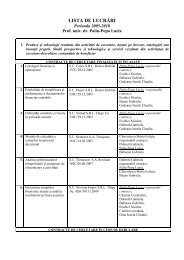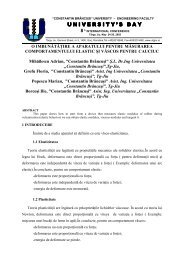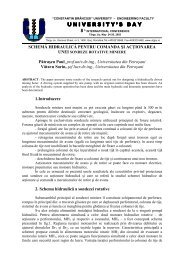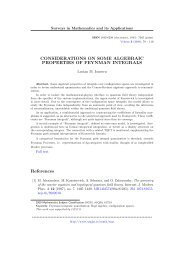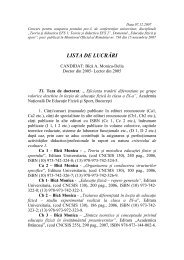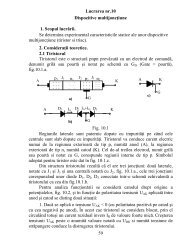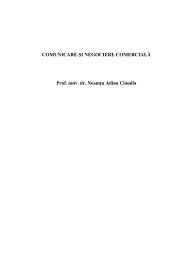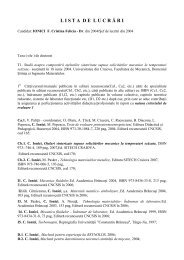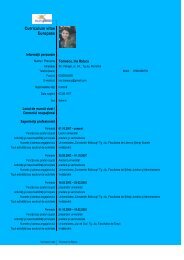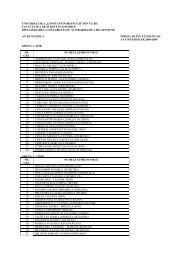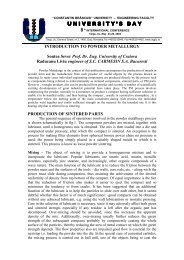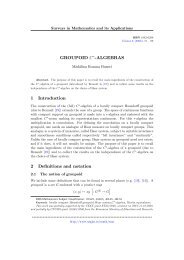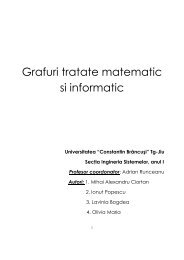NO. 2 / 2008 - Universitatea "Constantin BrâncuÅi"
NO. 2 / 2008 - Universitatea "Constantin BrâncuÅi"
NO. 2 / 2008 - Universitatea "Constantin BrâncuÅi"
You also want an ePaper? Increase the reach of your titles
YUMPU automatically turns print PDFs into web optimized ePapers that Google loves.
Analele Universităţii “<strong>Constantin</strong> Brâncuşi” din Târgu Jiu, Seria Litere şi Ştiinţe Sociale, Nr. 2/<strong>2008</strong>metaforă realizată fonetic şi configuratăgrafic). Alte sloganuri sunt rimate infantilşi sunt reproduceri fără efort ale unortipare preexistente şi arhicunoscute: ’’Încei 7 ani de-acasă/ Am învăţat de lapărinţi/Că omenia-i floare aleasă/ Ce nu sevinde pe arginţi’’ . Rimele au scopul de aatrage atenţia prin jocuri de cuvinte,parafraze glumeţe, figuri de construcţie.Sunt neinspirate cele la care se simteeleborarea , efortul de a construi rima, cudevieri nemotivate, ca în sloganul:’’La noiMircea Man ne place/ Ce promite aia face/Bate vântul frunzele/ S-au vorbit femeile/Cu bărbaţii împreună/ La judeţ pe Man sălpună’’, unde autorul( colectiv, dupămodelul textelor folclorice) deviazăsintactic prin anacolutul la noi, care, îngrupul verbal cu centrul a plăcea, ar fitrebuit configurat ca obiect indirect îndativ( nouă Mircea Man ne place). Lăsândla o parte recursul la cuvintele valiză( batevântul frunzele), specifice literaturiifolclorice, lungimea textului plictiseşte şidiluează scopul comunicării . Jocul decuvinte( formă a oralităţii), semnulmaximei diferenţieri faţă de rigiditatealimbii de lemn, creează, teoretic, impresiaminimală de surpriză, prin formule rimate,prin variaţii în metaforele clişeu. Însă, încazurile da faţă, ultimele două texte sunt,în afară de banale, şi extrem de păguboasepentru viitorul candidatului care şi le-aasumat, deoarece jocul de cuvinte facileste expresia unei reduse implicări aacestuia . În plus, jocul lexical prezintăpericolul de artificialitate; ca şi epigrama,calamburul de acest fel caută performanţaîntr-un mod cât se poate de ostentativ(subliniat şi prin grafeme: puncte desuspensie, ghilimele, semne deexclamaţie). Astfel, se obţin efecte maimult ornamentale decât de conţinut,neutralitatea informaţiilor fiind un loccomun.7. construite pe elemente contrastante, spre ase poziţiona diferit faţă de adversari,eufemizaţi prin pronume :’’Eu fac, ceilalţipromit’’,’’Alţii vorbesc, euconstruiesc’’,’’Ei încearcă să-ţi cumpereSome other slogans have a childish rhymeand are easy copies of some alreadyexisting and well known patterns:’’During the seven years spent at home / Ilearnt from my parents /That it is great tobehave / This cannot be sold away’’. Therhymes have the purpose to draw attentionby the word games, funny spuns, andconstruction phrases. The forced rhymesare not successful, as the ones when thewriter tried to hard to get a rhyme, as thefollowing example: ’’We like Mircea Manin place/ He keeps his word / The windblows the leaves / The women talked /Together with the men / To get Man as theleader of the county’’, where the author(following the pattern of the popularpoetries). Putting aside the using ofuseless words (the winds blows theleaves), specific to the popular literature,and the length of the text makes it boringand diminishes the purpose of thecommunication. The words game (an oralpoem), it creates, theoretically theminimal impression of a surprise, throughthe rhyming forms, through variationswithin the same pattern. But, for thehereby cases, the last two texts are notonly ordinary but also extremely harmlessfor the future of the candidate that haveassumed them, because the easy wordgame displays the fact he does not careabout his career. Plus, these artificialrhymes display the candidate is nothonest. In the same was as the epigram,this kind of pun looks for the performancein a very obvious way (highlighted byusing graphic sings). Therefore they arenot focused on the content, and theinformation is neuter.7. Built on contrasting elements, in order tobe on the opposite side of their opponent,named only subtitles, as the pronouns :’’Iwork, they others only promise’, ’’Theothers are talking, I am building’’, ’’Theytry to buy you vote with foolish promises,with money and food. I, XY, do not lie toyou, I do not use the public money to paymy campaign’’. This pronouns gameI/they sends the reader to the concreteAnnals of the „<strong>Constantin</strong> Brâncuşi” University of Târgu Jiu, Series Letters and Social Sciences, No. 2/<strong>2008</strong>30



